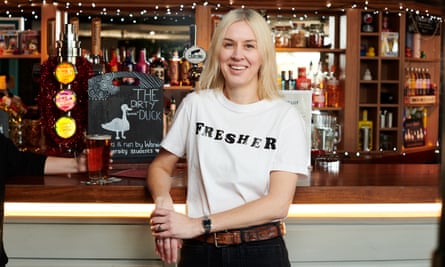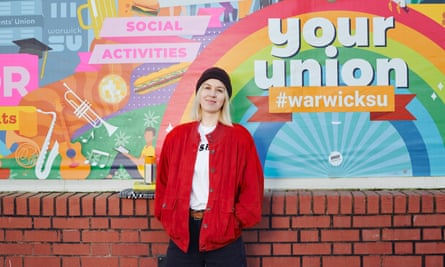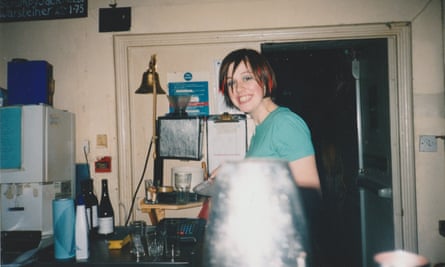Last time I had a first week at university, I successfully shaved a balloon covered in shaving foam without popping it, for which I won shots at the local nightclub, possibly jelly. It is 20 years later, and I am having my first week at university again. This time, I am 41. I am sticking a very strict and detailed timetable to my fridge, making plans for who is going to walk the dog on which days and desperately trying not to say anything that makes me stand out as a late millennial, such as “I used to write all my essays by hand,” and “Wow, literally everything’s online,” both of which came out of my mouth very early on. There are no jelly shots. I am horrified to find that I am constantly on the verge of letting an “in my day…” slip out. I don’t smoke, but I find that in my head, I am always sucking hard on a metaphorical cigarette, hoary with age and experience.
Last spring, I applied to study an MA in a new-ish discipline called Environmental Humanities. Over the summer, I struggled to explain what this was to anyone who asked, but I settled on “literature, with a Greta Thunberg twist”. There is more to it than that, it turns out. In the academic language that I am having to relearn, it is “interdisciplinary”, covering art, philosophy, social sciences and history, but with a focus on the climate crisis. The idea is to look at what might work alongside cold, hard science, in order to communicate new ways of thinking about the planet. Warwick University offered me a place and I am coming to the end of my first term.
Like Adele, education was calling me. At a recent Q&A, the singer told fans that at the end of her Las Vegas residency, she was planning to study for a degree in English Literature. Kim Kardashian seems to have been at law school for the best part of a decade. Alison Moyet told her followers that she had been awarded a first class honours degree in fine art printmaking, at the age of 62. “Did that graduating thing today. All a bit late doors but bees & bonnets & wot not,” she wrote, on X, formerly Twitter.
On campus, I look around, and feel as if there are not many of us “mature” students. In freshers’ week, I turned up at a mature students’ coffee morning. Nobody had handwritten their essays. Mature meant 22 or 25, at most. I puffed on that imaginary fag and left early. I asked Warwick how many postgraduate students are over 30 this year. Across all subjects, taught and in research, there are 857, out of 6,087 students in total. During Covid, our numbers dropped and dropped: in the academic year 20/21, there had been 1,887 over-30s. National figures are harder to come by. The last few years have been tumultuous and the definition of mature is loose. The most recent figures appear in a government briefing paper from 2021, which reported that there were 202,805 mature (defined as over-25) postgraduate students in the UK for the 2018/19 intake, making up 50% of entrants. There may be more of us than I thought.

I started my undergraduate degree when I was 18, going straight from sixth form college to university. Education changed the direction of my life completely. I am from a working-class background in north Lincolnshire. My grandparents were Irish immigrants who came to England in the 1960s for work; my grandmother liked to say that Angela’s Ashes had nothing on her childhood. I was the first person in my family to do A-levels. A teacher at my college suggested I apply for a summer school, run by the Sutton Trust, which sent kids with no family history of higher education to an Oxbridge college for a week, to show them what it was like to study there. I loved it, applied to Oxford University proper, and then I got in, which was a shock to the system for everyone.
Honestly, I had a fantastic time, even if it occasionally meant playing the working-class clown. Once, without malice, someone told me that I was his only poor friend. It was 2000, so there were tuition fees, but one of the many benefits of coming of age under a Labour government was that these were means-tested, so I was exempt from paying anything at all. I borrowed money for my living costs and had part-time jobs, which was against the rules, but they were rules for people wealthier than me. By my late 20s, I had paid off my student loan because it was so small. What a luxury.
I have always been bookish, always loved learning about new things. (This is part of the appeal of being a journalist. You find out a lot about a subject, write about it, forget everything, and move on to the next.) But I always felt as if I had given up on it too early. This is what happens when you’re 18, immature for your age, and leaving home for the first time. I had landed in a world so entirely different to anything I had known that it span me around and left me dizzy. I skipped lectures. I barely scraped by in my first-year exams. I shaved balloons. I did fine, because I knuckled down eventually, but I always had a niggling sense that I hadn’t quite appreciated it enough. I wanted to do an MA then, but the idea seemed impossible. Better to get a job. If you are working class, or were once (and that’s another story), then it is instilled in you, usually, to find security where you can, as quickly as you can.
Education hauled me out of one world and dropped me into another. Since then I have seen the wheels of social mobility stiffen and rust. We should be furious about this. For the last few years, I have volunteered for a charity called the Access Project. You get paired with what they call a “high potential, under-resourced student”, usually with no history of higher education in their family, and once a week you have a tutorial with them. I had one student who was a great talker and enjoyed arguing a point. I started to realise that I was enjoying it, too, all that reading, arguing and thinking.
It was this enjoyment that led me to consider that maybe I could go back to university, after all this time. This is important. The idea that there might be pleasure in learning more about the world runs counter to the current and prevailing narrative about education, particularly higher education, particularly in the arts, particularly after 13 years of Conservative rule. Education has become a question of “usefulness”, defined in economic terms, by a drumbeat of questions about how studying anything other than Stem subjects (science, technology, engineering and maths) could possibly turn a profit. It is pernicious and sinister and seeds a slow-creeping notion that we should not get ideas above our station, that we should not bother to find out more or ask deeper questions. Who and what does that suit, but a divided government that feeds on culture wars, and a society that prioritises hot takes and empty arguments, just as long as they sound good?

The past 13 years have seen swingeing cuts to arts and education funding across all levels, and after hearing why the arts don’t matter from so many education secretaries for so long, it is hard not to internalise a sense of pointlessness about studying anything that cannot be immediately monetised. But when I feel this way, I think about Iris Murdoch, the novelist and philosopher, who I learned about at university. In The Sovereignty of Good, she examines the idea of morality, which is not very profit-minded of her. “We are men and we are moral agents before we are scientists, and the place of science in human life must be discussed in words. This is why it is and always will be more important to know about Shakespeare than to know about any scientist,” she wrote.
I’d trust a dentist with a filling over a dramatist for sure, but her point stands, nevertheless. How useful was my undergraduate degree in language and literature? I learned about great writers and their ideas, but I also learned to express myself and to have the confidence to be in spaces filled with people who have been confident and self-assured since they learned to speak. Is that of low value or high? I wonder if the people doling out these value judgments, insisting on funding cuts, have any idea what it means for education to truly matter, especially when it is hard-won, and not handed over at birth.
It requires an enormous leap of faith to pay for an arts or humanities degree today, if you consider that young people do not have the luxury of a £3,000 cap on annual fees or any government exemption that would assist “under-resourced” families. The average debt for a student graduating in England in 2023 will be £44,940. If that had been the case when I was 18, I doubt I would have gone anywhere near a university.
Still, even now, returning to study has been a massive decision, and it was possible for several reasons. I don’t have children, so I have more time and expendable income than my friends who are parents. Going to Warwick meant that I could live at home, which is close-ish to the campus, and commute, which keeps living costs at a basically manageable level. I took out the government’s postgraduate loan to cover the fees, which it just about does, though not on every course I looked at, and it certainly doesn’t stretch to anything beyond that. But again, I find that I am lucky, as I can still work, albeit less, and my work is flexible, and can be shifted around. I have never been so tired and busy, and I’ll be in debt again, but not as much debt as my fellow students, who are starting out in their adult lives under an enormous and unfair financial burden.

When I told my friends that I was going back to university, several sent me the same meme, from 30 Rock: a middle-aged Steve Buscemi, wearing a T-shirt that reads MUSIC BAND, holding a skateboard, in a backwards baseball cap, in a school hallway, saying “How do you do, fellow kids?” (Writing out a description of a meme is exactly the sort of thing a young person would not do.) A couple of them asked if I was “doing a Miranda” – in the most recent series of And Just Like That, the former corporate lawyer starts an internship at the Human Rights Campaign, in her 50s, where she is semi-bullied for her privilege by her far younger colleagues.
It’s not very Miranda at all. The students in my classes are open and kind. They have accepted the presence of an older person in their midst and I am grateful to them for being so nice. There are days where I feel ancient and ossified. I am the only person over 25 on the bus. It stands out to me that there are plugs everywhere and that young people are relentlessly hydrated, water and coffee on the table throughout all seminars. There is nonstop marketing, constant surveys: tell us your opinions on academic integrity and win an Amazon voucher. I have realised how often I say, “Did you see so-and-so on TV?” and how often, ie every time, young people say no, as they don’t watch TV.
Is any of this valuable? Will it be worth it? It depends on your definition of value and worth. Considering that I am studying the environment and all the terrible things that are happening to it, I feel strangely happy, happier than I have in years, even hopeful. I feel awake and alive. Looking at it directly, instead of burying my head in the sand, is invigorating. If you are working class and “clever”, you might feel an odd sense of shame about it. I did, and do; I can’t even write clever without dressing it up in punctuation. But for the first time in my life, that shame is starting to leave me. I have given myself permission to think again, and in doing so, I notice, more and more, how much and how often this instinct is stifled. Education is powerful. It is valuable. It is worthy. We must guard it ferociously, for everyone.
© OfficialAffairs